During a trip to Kyiv with Ukrainian President Volodymyr Zelensky, the leader of the left-wing Labour Party in Britain, Sir Keir Starmer vowed that the UK’s military backing of the war against Russia will remain the same should there be a change in government in Westminster next year.
The Leader of the Opposition in Parliament, Labour leader Sir Keir Starmer said that the British government’s position on Ukraine, which to date has been the most hawkish outside of Washington, will continue down the same path if he is put into Downing Street after the next general election — which he is currently heavily favoured to win.
Following the meeting with Zelensky, Starmer said according to The Guardian: “I was able to tell him that should there be a change of government when we have a general election here, the support for Ukraine will remain the same. It’s a very important message for me to be able to relay to the president face-to-face, and I’ve been able to do that this afternoon.”
“I stressed that the Labour party supports and would maintain the defence, training, and technological support the current UK government is providing,” Starmer said. “I’ve said throughout this conflict there will be no difference between the political parties on this, so we will continue to work with the government to see what further support we can provide.”
Sir Keir went on to say that if elected prime minister, he would push for war crimes tribunals against Moscow officials as well as demands for reparations from Russia to reconstruct Ukraine.
“There has to be justice for this. There has to be justice in The Hague and there has to be proper reparation in the rebuilding of Ukraine,” he said.
Since taking over the Labour Party, Starmer has tried to rebrand the left-wing party with a more “patriotic” tinge than under his predecessor, far-left socialist Jeremy Corbyn, who was blocked by Starmer from running as a Labour MP in the next general election under the pretence of eliminating anti-semitism from the ranks of the party.
In his attempt to root out Corbyn’s hard left faction from his party, Starmer has wielded the issue of Ukraine as a political weapon, vowing to expel any MP who expressed sympathies for the Russian invasion or Moscow’s line against the American-led NATO alliance’s expansion east.
“Let me be very clear. There will be no place in this party for false equivalence between the actions of Russia and the actions of Nato,” Starmer said last February.
With the ousting of Corbyn, who has consistently opposed funding the war in Ukraine and represented one of the few prominent political figures in Westminster to call for peace negotiations with Russia, Starmer has made steps toward solidifying his vision of returning the Labour Party to its position under former Prime Minister Tony Blair.
While Blair pushed forward a radical pro-open borders social agenda at home, he was able to successfully skirt the normal accusations of weakness against left-wing leaders by adopting a hawkish neo-conservative approach on the world stage, joining hand-in-hand with then-American President George Bush in the Afghanistan and Iraq wars, which cost the lives of hundreds of British soldiers and tens of billions in taxpayer money.
Since last February, the British government has already sent nearly £4 billion to Ukraine in the form of military, humanitarian, and economic aid. In terms of direct military aid, the UK has only lagged behind the United States, having sent £2.3 billion in the form of weapons and other military equipment over the past year. With both parties in apparent lockstep on the war, this figure is only likely to rise, with the current government admitting that it is actively considering sending fighter jets and long-range missiles to the war zone.
Apparently emboldened by bi-partisan support in London and in Washington, President Zelensky said on Thursday that there can be no peace deal with Putin if Ukraine is forced to cede some of its territory — including ethnically Russian areas in the Donbas region — to Russia, arguing that only more weapons will bring about peace.
“Of course, modern weapons speed up peace. Weapons are the only language Russia understands,” Zelesnksy said.

COMMENTS
Please let us know if you're having issues with commenting.